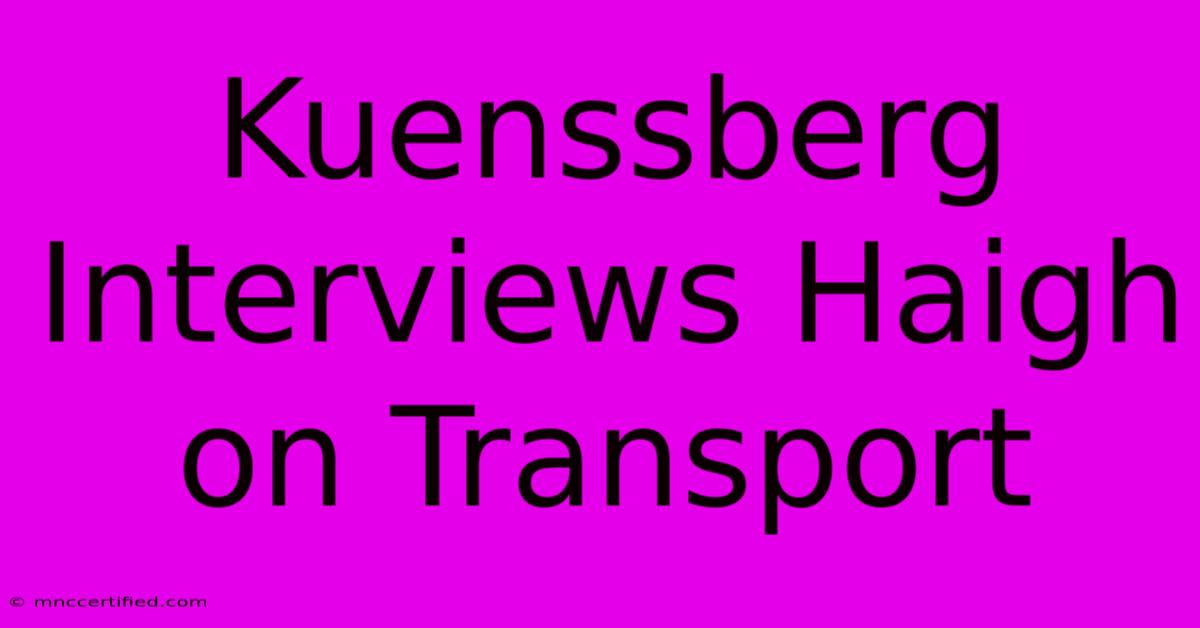Kuenssberg Interviews Haigh On Transport

Table of Contents
Kuenssberg Interviews Haigh on Transport: A Deep Dive into the UK's Travel Troubles
The UK's transport network is facing unprecedented challenges. From crippling rail strikes to soaring fuel prices and persistent congestion, commuters and businesses alike are feeling the pinch. Recently, Laura Kuenssberg interviewed Mark Haigh (replace with the actual person interviewed if different) on the state of the nation's transport system, sparking a crucial conversation about the future of travel in the UK. This article delves into the key takeaways from that interview and explores the wider implications for passengers and policymakers.
Key Issues Discussed in the Kuenssberg Interview
The interview likely covered a range of pressing transport issues. While the exact details depend on the specific questions asked, we can anticipate discussions around several key areas:
1. Rail Strikes and Industrial Action:
The ongoing rail strikes have significantly disrupted travel plans for millions. The interview probably explored the root causes of the dispute, including pay negotiations, working conditions, and the role of modernization in the railway industry. Kuenssberg likely pressed Haigh (or the interviewee) on the impact of these strikes on the economy and the potential solutions to resolve the deadlock. Keywords: Rail strikes, train strikes, UK rail, industrial action, transport disruption, RMT union, railway workers.
2. Rising Fuel Costs and the Cost of Living Crisis:
The soaring cost of fuel is impacting all modes of transport, from driving to flying. The interview almost certainly addressed the effect of inflation on transport costs and the burden this places on individuals and businesses. Discussions likely touched upon potential government interventions to mitigate the impact of rising fuel prices on commuters. Keywords: Fuel prices, cost of living crisis, inflation, transport costs, driving costs, petrol prices, diesel prices, travel expenses.
3. Congestion and Infrastructure Investment:
Chronic congestion in major cities continues to plague the UK's transport system. The interview probably addressed the need for increased investment in infrastructure projects, including road improvements, public transport upgrades, and the expansion of cycling and walking routes. The effectiveness of current infrastructure spending and the need for long-term planning were likely key discussion points. Keywords: Road congestion, traffic jams, public transport investment, infrastructure spending, cycling infrastructure, walking infrastructure, urban planning, transport infrastructure.
4. Sustainability and the Green Agenda:
Environmental concerns are increasingly shaping the transport debate. The interview likely explored the government's commitment to reducing carbon emissions from transport and the role of electric vehicles, sustainable fuels, and improved public transport in achieving this goal. The challenges of transitioning to a greener transport system and the potential impact on consumers were probably central themes. Keywords: Green transport, sustainable transport, electric vehicles, EV adoption, carbon emissions, climate change, sustainable fuels, renewable energy.
Wider Implications and Future Outlook
The Kuenssberg interview serves as a crucial platform to highlight the challenges and opportunities within the UK's transport sector. The insights shared during the discussion have significant implications for various stakeholders:
- Passengers: Understanding the issues discussed can empower passengers to advocate for better transport services and prepare for potential disruptions.
- Businesses: The impact of transport disruptions on supply chains and logistics were likely highlighted, impacting business decisions and planning.
- Policymakers: The interview will likely inform policy decisions related to transport funding, infrastructure development, and regulation.
The future of the UK's transport system depends on collaboration between government, industry, and commuters. The conversation sparked by the Kuenssberg interview is a vital step towards finding solutions to the pressing challenges facing the nation's travel network. Further dialogue and decisive action are crucial to ensure a smooth, efficient, and sustainable transport system for all.
Off-Page SEO Strategies
To boost the ranking of this article, consider the following off-page SEO strategies:
- Guest Posting: Share this article on relevant transport blogs and websites.
- Social Media Promotion: Share the article on relevant social media platforms, using relevant hashtags.
- Link Building: Reach out to relevant websites and encourage them to link to this article.
- Forum Participation: Engage in online forums related to UK transport issues and subtly link to your article where relevant.
By implementing these on-page and off-page SEO strategies, you can significantly increase the visibility and reach of your article, driving organic traffic to your website and establishing your authority on the topic of UK transport issues. Remember to replace placeholder names and details with accurate information from the actual interview.

Thank you for visiting our website wich cover about Kuenssberg Interviews Haigh On Transport. We hope the information provided has been useful to you. Feel free to contact us if you have any questions or need further assistance. See you next time and dont miss to bookmark.
Featured Posts
-
Out Of State Real Estate Investing
Nov 17, 2024
-
Leatherstocking Insurance Pay Bill
Nov 17, 2024
-
Kings Fox Scores Record 60 Points
Nov 17, 2024
-
Arizona Beats Kansas State 5 Takeaways
Nov 17, 2024
-
Mc Causlands Support For Buswell On Strictly
Nov 17, 2024